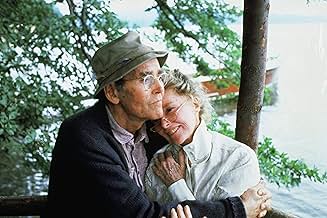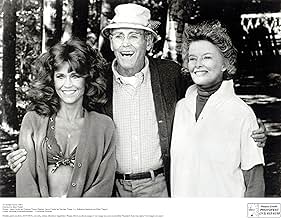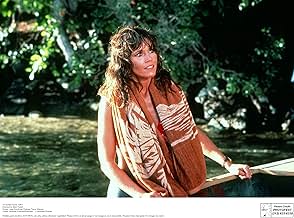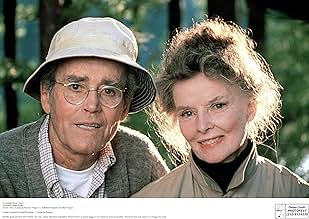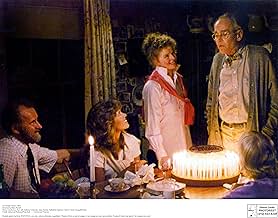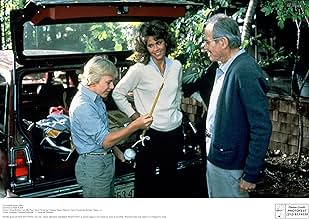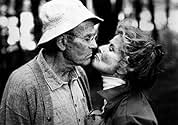IMDb रेटिंग
7.6/10
37 हज़ार
आपकी रेटिंग
अपनी भाषा में प्लॉट जोड़ेंCurmudgeon Norman is estranged from his daughter Chelsea. Nevertheless, at Golden Pond he and his wife agree to look after Billy, the son of Chelsea's new boyfriend, and a most unexpected re... सभी पढ़ेंCurmudgeon Norman is estranged from his daughter Chelsea. Nevertheless, at Golden Pond he and his wife agree to look after Billy, the son of Chelsea's new boyfriend, and a most unexpected relationship blooms.Curmudgeon Norman is estranged from his daughter Chelsea. Nevertheless, at Golden Pond he and his wife agree to look after Billy, the son of Chelsea's new boyfriend, and a most unexpected relationship blooms.
- 3 ऑस्कर जीते
- 14 जीत और कुल 24 नामांकन
फ़ीचर्ड समीक्षाएं
Oh,the numerous memorable characters Henry Fonda brought to the screen over the years.His most memorable came in his final film,On Golden Pond. This film brought to light two important realizations for me.Family togetherness is one of the most important things we have in life,and we had better resolve our differences as a family and get along because we can't go back and correct the things we come to regret.Secondly,I came to realize that elderly couples are more than the stereotype we sometimes force upon them.They don't cease to be affectionate and sexual merely because they have gotten older.Henry Fonda and Katharine Hepburn made a delightful couple here and make you wish they had worked together more often through the years,but unfortunately,this was their first and only film together.Also,the pairing of Fonda with real life daughter Jane was indeed a delight to see.Their own troubled relationship made them naturals for their parts as a father and daughter coming together after years of tension.You could sense that at times, Henry and Jane were not acting at all when it came to their scenes with one another,making these scenes more realistic and effective.Henry Fonda received a well deserved Oscar for this film.I watched the night he received it,and recall his reaction from his home(he was too ill to attend the ceremony),and the tears streaming down his face.I couldn't help but shed a tear or two myself.I'm sure I was not the only one.Great film.
I was expecting a very boring movie. All I thought about this was a couple of old people sitting around talking at some cabin. I was way off. This film is quite the opposite. Things do happen that make this movie well worth watching. Henry Fonda is excellent and made me laugh really hard with his sarcastic answers to many questions. I do believe Jane Fonda was not in the film enough. Of course we can't go without mentioning Katherine Hepburn. She is one of the greats and this film has proof.
This is a film I would definitely recommend to others. It is light hearted and dramatic all at the same time. Watch this film it will entertain you.
This is a film I would definitely recommend to others. It is light hearted and dramatic all at the same time. Watch this film it will entertain you.
Mark Rydell's On Golden Pond was a surprise hit in 1981, finishing third in box office grosses after Rocky III and E.T. Such an occurrence was unheard of in Hollywood, considering the key players in the film, Henry Fonda and Katharine Hepburn, each had not had a hit film in almost twenty years and were both hardly spring chickens in the business. Both these veteran actors proved they could still make it in Hollywood among young starlets, and triumph. Still, when you see "On Golden Pond," you sense that their teaming together for the first time in their careers is purely a special occasion, an opportunity of a lifetime that few actors in their seventies receive. They in turn have left us with a wonderful showcase of movie talent, a film of warmth, good humor, and love.
It always amazes me when I read that Henry Fonda had only received two Oscar nominations during his career, one of which he earned for this film. Like his good friend Jimmy Stewart, Fonda was rarely a boisterous actor. He had a natural ease to his acting, a gift for making audiences believe that every word he uttered was truth. Now, in his final screen performance as Norman Thayer Jr., Fonda had to reach deep into his own personal experience and his advancing years to create a character who struggles with his own mortality. Norman is a grouchy curmudgeon who has memory lapses and heart palpitations. He has a loving and cheerful wife, Ethel (Hepburn), but a difficult relationship with his only daughter, Chelsea (Jane Fonda). He and Ethel journey back to their cottage on the lake for what may be their last summer. Immediately, Norman comes face to face with his old age and his inability to remember what should be familiar sights. I especially like the scene where he gets lost in the woods looking for strawberries and scares himself when he is unable to find his way back. Ethel has such faith in him, sure he will "get back on that horse" and be as valiant as he once was. What more could you want from a wife?
Chelsea arrives after many years away from her parents, bringing with her a new boyfriend (Dabney Coleman) and his son, Billy (Doug McKeon). You can sense the tension between Chelsea and Norman the minute she walks in the door. This reunion is fascinating not only because we can never tell where the difficulty lies in their relationship, but also the fact that these problems also exist on and off the screen. The father-daughter relationship between Henry and Jane was also very turbulent ever since Jane began her protests in Vietnam, much to the chagrin of her father. This collaboration of the two was meant to mend fences between them. Not often do the personal lives of actors collide so eloquently in Hollywood, but here it seems just about right.
The sequence where Norman and Bill (Coleman) attempt to build a conversation is originally conceived and acted so naturally. He carefully asks Norman if it would be alright if Chelsea and he sleep together in the same room at the cottage. Of course, Norman makes this confrontation as difficult as possible, making Bill nervous and jerking him around. Ironically, Bill comes back at him, not allowing Norman to use him in petty mindgames and hoping they would become friends, which is obviously "not an easy task." This is an unsettling turn for Norman and the audience, but it is necessary for the story to progress and for Norman to respond accordingly to the other characters in the story.
Ethel and Norman volunteer to let Billy stay with them for the summer while Chelsea and Bill head off to Europe. Billy is not pleased with the arrangement at the outset, but gradually bonds with Norman through learning to fish on the pond. While Billy is not necessarily an original character, it is fascinating to see him try to understand Norman, and in turn how Norman learns to associate with the son he never had. It is a learning experience for both of them, even though they are many generations apart.
Many reviewers have remarked that ON GOLDEN POND uses a conventional story and revives it with great performances from the cast. It is interesting to note that the screenwriter, Ernest Thompson, altered his own play in order to escape a bit of the conventionality that the film medium required. The framework may seem as original as an old shoe, but the added touches in the script and its delivery give this film a certain magic that only classical Hollywood films possessed. Fonda has a great way to end a career with this role, placing himself completely within Norman's world and searching within and through the role for his own solutions to life's problems. His Oscar was given to him for more reasons than mere charity. Hepburn is delightful as Ethel, working so well with Fonda that it does not seem as if they are acting. For a couple of old Hollywood actors who never even met before this, they each prove they are true masters of their craft. Jane Fonda takes a supporting role this time, incorporating some of the same motives as her father into her part, and as a result delivers a special performance. Mark Rydell is one of those directors that often gets left off the list of the all-time greats, but proves once again here he is a masterful storyteller. In this project, he allows both the visual elements of the pond and his actors to make magic, a truly memorable combination.
On Golden Pond is not an epic, but what it accomplishes runs close to epic proportions. It is very rare that a stageplay converts so well to the screen like this one. On Golden Pond is vibrant, emotional, and so heartfelt, it is impossible not to like, unless you are a curmudgeon like Norman Thayer. It is also unique that great actors such as these will agree to try again for Hollywood glory so late in their careers. It is up to us viewers to experience this wonder before the chance is lost and these thespians finally close up the cottage and head off to their retirement.
It always amazes me when I read that Henry Fonda had only received two Oscar nominations during his career, one of which he earned for this film. Like his good friend Jimmy Stewart, Fonda was rarely a boisterous actor. He had a natural ease to his acting, a gift for making audiences believe that every word he uttered was truth. Now, in his final screen performance as Norman Thayer Jr., Fonda had to reach deep into his own personal experience and his advancing years to create a character who struggles with his own mortality. Norman is a grouchy curmudgeon who has memory lapses and heart palpitations. He has a loving and cheerful wife, Ethel (Hepburn), but a difficult relationship with his only daughter, Chelsea (Jane Fonda). He and Ethel journey back to their cottage on the lake for what may be their last summer. Immediately, Norman comes face to face with his old age and his inability to remember what should be familiar sights. I especially like the scene where he gets lost in the woods looking for strawberries and scares himself when he is unable to find his way back. Ethel has such faith in him, sure he will "get back on that horse" and be as valiant as he once was. What more could you want from a wife?
Chelsea arrives after many years away from her parents, bringing with her a new boyfriend (Dabney Coleman) and his son, Billy (Doug McKeon). You can sense the tension between Chelsea and Norman the minute she walks in the door. This reunion is fascinating not only because we can never tell where the difficulty lies in their relationship, but also the fact that these problems also exist on and off the screen. The father-daughter relationship between Henry and Jane was also very turbulent ever since Jane began her protests in Vietnam, much to the chagrin of her father. This collaboration of the two was meant to mend fences between them. Not often do the personal lives of actors collide so eloquently in Hollywood, but here it seems just about right.
The sequence where Norman and Bill (Coleman) attempt to build a conversation is originally conceived and acted so naturally. He carefully asks Norman if it would be alright if Chelsea and he sleep together in the same room at the cottage. Of course, Norman makes this confrontation as difficult as possible, making Bill nervous and jerking him around. Ironically, Bill comes back at him, not allowing Norman to use him in petty mindgames and hoping they would become friends, which is obviously "not an easy task." This is an unsettling turn for Norman and the audience, but it is necessary for the story to progress and for Norman to respond accordingly to the other characters in the story.
Ethel and Norman volunteer to let Billy stay with them for the summer while Chelsea and Bill head off to Europe. Billy is not pleased with the arrangement at the outset, but gradually bonds with Norman through learning to fish on the pond. While Billy is not necessarily an original character, it is fascinating to see him try to understand Norman, and in turn how Norman learns to associate with the son he never had. It is a learning experience for both of them, even though they are many generations apart.
Many reviewers have remarked that ON GOLDEN POND uses a conventional story and revives it with great performances from the cast. It is interesting to note that the screenwriter, Ernest Thompson, altered his own play in order to escape a bit of the conventionality that the film medium required. The framework may seem as original as an old shoe, but the added touches in the script and its delivery give this film a certain magic that only classical Hollywood films possessed. Fonda has a great way to end a career with this role, placing himself completely within Norman's world and searching within and through the role for his own solutions to life's problems. His Oscar was given to him for more reasons than mere charity. Hepburn is delightful as Ethel, working so well with Fonda that it does not seem as if they are acting. For a couple of old Hollywood actors who never even met before this, they each prove they are true masters of their craft. Jane Fonda takes a supporting role this time, incorporating some of the same motives as her father into her part, and as a result delivers a special performance. Mark Rydell is one of those directors that often gets left off the list of the all-time greats, but proves once again here he is a masterful storyteller. In this project, he allows both the visual elements of the pond and his actors to make magic, a truly memorable combination.
On Golden Pond is not an epic, but what it accomplishes runs close to epic proportions. It is very rare that a stageplay converts so well to the screen like this one. On Golden Pond is vibrant, emotional, and so heartfelt, it is impossible not to like, unless you are a curmudgeon like Norman Thayer. It is also unique that great actors such as these will agree to try again for Hollywood glory so late in their careers. It is up to us viewers to experience this wonder before the chance is lost and these thespians finally close up the cottage and head off to their retirement.
There's a rather grumpy chap called Norman Thayer, as he's got older he's become quite a purveyor, of snide and sneering comments, of complaining, grieving laments, like a rusting, buckled, beat up, old conveyer; with his wife they've settled down on golden pond, a place that they both love, and are so fond, then daughter Chelsea passes by, with her new partner by her side, and a young lad that they leave there, and then they're gone; it takes a while for the curmudgeon to develop, a liking for the boy, and to envelop, but the ice quite quickly thaws, as they fish for trout with jaws, at the end you'll feel refreshed, and full of hope.
As much as I love Henry Fonda, and he is spectacular in this, it's his daughter who bowls me over, she always does, although Katherine Hepburn should take some credit too.
As much as I love Henry Fonda, and he is spectacular in this, it's his daughter who bowls me over, she always does, although Katherine Hepburn should take some credit too.
There is a film like this very rarely and indeed it works like we actually do know the Thayers. Indeed we can most certainly relate to Henry Fonda while Katharine Hepburn is more then an incredible actress. In this film the mix of drama and comedy from her as a character shows why she won that record breaking fourth Oscar statuette.
I'll just say the story in a nutshell. Jane Fonda and her father did not get along. Jane, however wanted one last chance for a close bond to her father and bought the rights to the play "On Golden Pond." In the film the Oscar winning performance by Henry Fonda (his only in a career spanning decades.) Jane fully deserved her Oscar nomination for her exceptional (and of course very realistic performance.) In the actual film the chemistry of Hepburn and (Henry) Fonda is perfect. This film really to try to put into words is a really touching gem that makes you feel so uplifted. Your spirits soar and any relationship that can be amended and is anywhere near as strong in the film (From Hepburn and Fonda) shows us what acting can do.
Oscars abound, critical praise and very likely the last of the old fashioned melodramas (Mainly because acting has moved on a generation from these sorts of films.) The sentiment and feel is perfectly placed and the storeys clicked so much like the Fonda Father- Daughter relationship. It is a warm intelligent character based film that i would advise everyone to see at once!
I'll just say the story in a nutshell. Jane Fonda and her father did not get along. Jane, however wanted one last chance for a close bond to her father and bought the rights to the play "On Golden Pond." In the film the Oscar winning performance by Henry Fonda (his only in a career spanning decades.) Jane fully deserved her Oscar nomination for her exceptional (and of course very realistic performance.) In the actual film the chemistry of Hepburn and (Henry) Fonda is perfect. This film really to try to put into words is a really touching gem that makes you feel so uplifted. Your spirits soar and any relationship that can be amended and is anywhere near as strong in the film (From Hepburn and Fonda) shows us what acting can do.
Oscars abound, critical praise and very likely the last of the old fashioned melodramas (Mainly because acting has moved on a generation from these sorts of films.) The sentiment and feel is perfectly placed and the storeys clicked so much like the Fonda Father- Daughter relationship. It is a warm intelligent character based film that i would advise everyone to see at once!
क्या आपको पता है
- ट्रिवियाThe brown Fedora worn by Henry Fonda belonged to Spencer Tracy and was given to Fonda by Katharine Hepburn on the first day on the set. Overwhelmed with the gesture, Fonda painted a still life watercolor of the three hats he wore in the film and gave the original to Hepburn as a gift. He had 200 lithographs made of the painting and sent one to every person who worked on the film. Each copy was numbered and personally signed by Fonda, thanking each person by name. In her autobiography, Hepburn wrote that she gave the painting to screenwriter Ernest Thompson. After Fonda's death, she found the painting to be a sad reminder of him and Tracy.
- गूफ़The numbers of the pump show the cost of fuel to be 67.9 cents per gallon with a total cost of $19.00. The price of gasoline in 1981 was around $1.30 per gallon.
However, old pumps were not capable of charging more than 99.9 cents per gallon, so they were set to half the price, and the total was then doubled. That is why the teenager asks for $38.00.
- इसके अलावा अन्य वर्जनWhen premiered on TV, an extra credit dedicated to Henry Fonda was added to the final credits.
- कनेक्शनEdited into Reflections on Golden Pond (2003)
- साउंडट्रैकHappy Birthday to You
(uncredited)
Written by Mildred J. Hill & Patty S. Hill
[Sung by all for Norman's birthday]
टॉप पसंद
रेटिंग देने के लिए साइन-इन करें और वैयक्तिकृत सुझावों के लिए वॉचलिस्ट करें
- How long is On Golden Pond?Alexa द्वारा संचालित
विवरण
बॉक्स ऑफ़िस
- बजट
- $75,00,000(अनुमानित)
- US और कनाडा में सकल
- $11,92,85,432
- US और कनाडा में पहले सप्ताह में कुल कमाई
- $89,213
- 6 दिस॰ 1981
- दुनिया भर में सकल
- $11,92,85,810
इस पेज में योगदान दें
किसी बदलाव का सुझाव दें या अनुपलब्ध कॉन्टेंट जोड़ें



